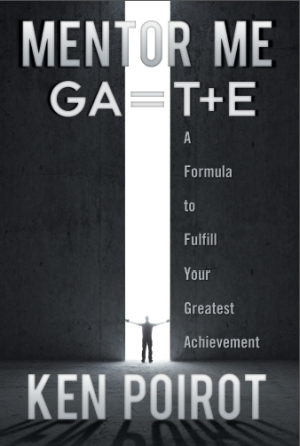
Mentor Me
GA=T+E―A Formula to Fulfill Your Greatest Achievement
This enlightening book encourages self-discovery and teaches the principles of mentoring others.
Ken Poirot’s Mentor Me: GA = T + E—A Formula to Fulfill Your Greatest Achievement is an unusual book with a dual purpose: helping the reader mentor others as well as himself or herself. Poirot is a financial professional whose current goal is to spend his time and energy “helping, motivating, inspiring, and influencing others to create their own Greatest Achievement.” He constructed Mentor Me as a workbook of sorts—a carefully integrated package of inspirational advice and exercises, or “action steps,” designed to lead the reader to self-fulfillment.
Poirot begins with a simple formula that pervades the text: “GA = T + E,” or “Greatest Achievement = Time and Energy.” In essence, this means the more time and energy the reader applies to setting and reaching a goal, the more likely it will be reached. Poirot cleverly uses the letters of his formula to express that “this book is the GATE to your tomorrow,” while encouraging the reader to be the “GATE” to helping others as well.
In the first chapter, the author leads the reader through a tripartite process: first, defining a “Greatest Achievement”; second, noting those who have been most inspirational and influential and are, therefore, role models; third, turning one’s Greatest Achievement into an actionable goal. In the next chapter, Poirot explains in detail how he developed a one-year goal and used time management to keep his focus on the key accomplishments (he calls them the “Big Rocks”) needed to reach that goal. He also discusses his concept of “high-impact” and “low-impact” days—a unique method he developed to maximize productivity and efficiency.
At this point in the book, Poirot chooses to depart from the subjects of goal-setting and time management to explore personality styles, effective communications, and how one learns. While the shift to these new topics seems somewhat abrupt, this portion of Mentor Me may be most instructive to the reader interested in mentoring. For example, Poirot’s discussion of four personality styles, which includes a “personality styles quiz,” is particularly fascinating. The author details the traits of each personality style and also suggests how people with each type can get along with others. In addressing communications, he includes interesting observations about body language and gender differences. His analysis of the different ways in which people learn is equally enlightening.
Poirot concludes with some sage advice about how to handle conflict, and a closing chapter that incorporates many of the principles of the book into real-world examples from the author’s own experiences. He deftly demonstrates how he personally put into practice much of the advice he conveys in the book; his story about an employee he mentored is especially relevant.
Poirot’s writing style is conversational, educational, and often inspirational. Chapters are well organized, and exercises are integrated into the text at appropriate, logical spots. The text is easy to read, and the pages are nicely composed. However, the book would have benefited from additional references and recommended sources of further reading.
Mentor Me offers plenty of insight into oneself as well as others, and it should prove to be a valuable guide to the art of mentoring.
Reviewed by
Barry Silverstein
Disclosure: This article is not an endorsement, but a review. The publisher of this book provided free copies of the book and paid a small fee to have their book reviewed by a professional reviewer. Foreword Reviews and Clarion Reviews make no guarantee that the publisher will receive a positive review. Foreword Magazine, Inc. is disclosing this in accordance with the Federal Trade Commission’s 16 CFR, Part 255.
